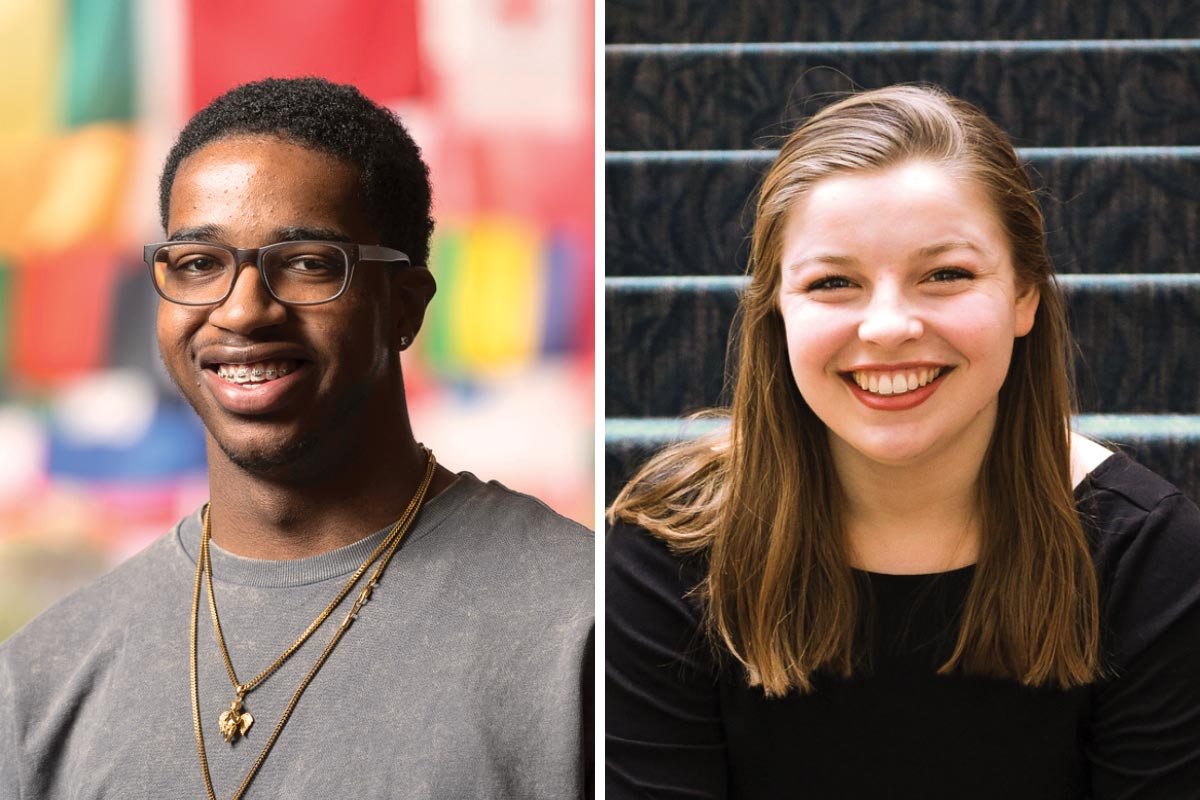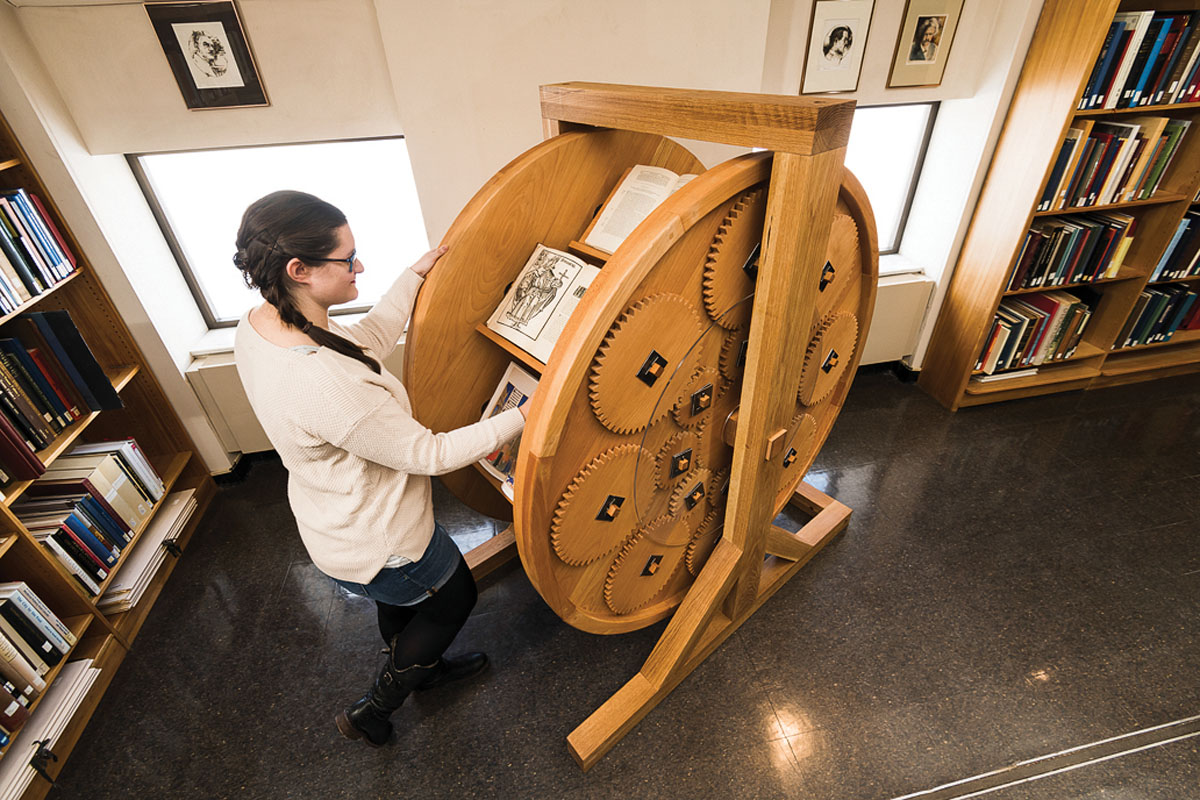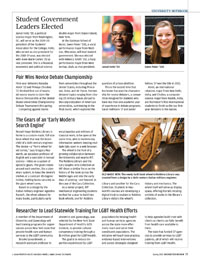University Notebook
 (Photo: J. Adam Fenster (Holtz); Emma Chang ’20 (Paker))
(Photo: J. Adam Fenster (Holtz); Emma Chang ’20 (Paker))Jamal Holtz ’20, a political science major from Washington, DC, will serve as the 2019–20 president of the Students’ Association for the College. Holtz, who served as vice president for the 2018–19 year, was elected with Anne Marie Cortes ’20 as vice president. She is a financial economics and political science double major from Staten Island, New York.
At the Eastman School of Music, Gwen Paker ’20E, a vocal performance major from Madison, Wisconsin, will lead student government. She was elected with Rebecca Smith ’21E, a harp performance major from West Jordan, Utah, as vice president.
Pair Wins Novice Debate Championship
First-year debaters Natasha Abrol ’22 and Prinaya Choubey ’21 finished first out of nearly 60 novice teams to claim the Novice Division title at the United States Universities Championship Debate Tournament this spring.
Competing against teams from universities throughout the United States, including Princeton, Duke, and Air Force, the two debated topics ranging from closing US military bases abroad to the corporatization of American universities, culminating in the final round, which explored the question of prison abolition.
This is the second time that Rochester has won the championship for novice debaters, a competition designed for students who have less than one academic year of experience in debate programs. Sarah Hofmann ’17 and Junior Ndlovu ’17 won the title in 2015.
Abrol, an international relations major from New Delhi, India, and Chubey, a computer science major from Nashik, India, are Rochester’s first international students to finish as the top first-year debaters in the nation.
 OLD MADE NEW: The newly built book wheel in Robbins Library was created from a design by a 16th-century Italian military engineer. (Photo: J. Adam Fenster)
OLD MADE NEW: The newly built book wheel in Robbins Library was created from a design by a 16th-century Italian military engineer. (Photo: J. Adam Fenster)The Gears of an ‘Early Modern Search Engine’
Rossell Hope Robbins Library is home to a custom-made, full-size book wheel that was the brainchild of a 16th-century engineer. The device—a “Ferris wheel for old tomes,” says Gregory Heyworth, an associate professor of English and a specialist in textual science—relies on a system of epicyclic gears. The gears rotate around each another, like a planetary system, to keep the device’s shelves at a constant 45-degree incline, holding books securely as the giant wheel turns.
Based on a design by the Italian military engineer Agostino Ramelli, the wheel allowed for many books, particularly early encyclopedias and editions of classical work, to be open at the same time, akin to modern-day information seekers keeping multiple tabs open in a web browser.
The wheel is the fruit of a growing collaboration between the University and nearby RIT. The Robbins Library and the Cary Graphic Arts Collection at RIT share a similar focus on the history of the book across the Middle Ages and into the early days of printing—and beyond, in the case of the Cary Collection.
As a senior project, RIT mechanical engineering students worked for a year to build two book wheels, one for Robbins Library and another for the Cary Collection. Students in Heyworth’s courses are developing a digital kiosk to explain to Robbins Library visitors the wheel’s history and mechanics. The wheel itself will serve as display space, offering literally rotating exhibits of works in the library’s collection.
Researcher to Lead Statewide Training for LGBT Health Efforts
A member of the Department of Obstetrics and Gynecology will lead training programs for organizations across New York state that provide health care and human services to the LGBT community.
Brooke Levandowski, a research assistant professor in obstetrics and gynecology, was selected by the New York State Department of Health’s AIDS Institute, to provide cultural competency training through a $1 million grant for LGBT-Health.
The goal is to reduce disparities experienced by LGBT populations by helping health and human services agencies across the state more effectively reach and serve their constituent populations. The initiative will teach best-practice, evidence-based interventions and access strategies designed to help agencies build trust with clients so clients can fully benefit from health care available to them.
The state has funded 37 agencies to provide services to LGBT patients, all of which will receive training from LGBT-Health.

